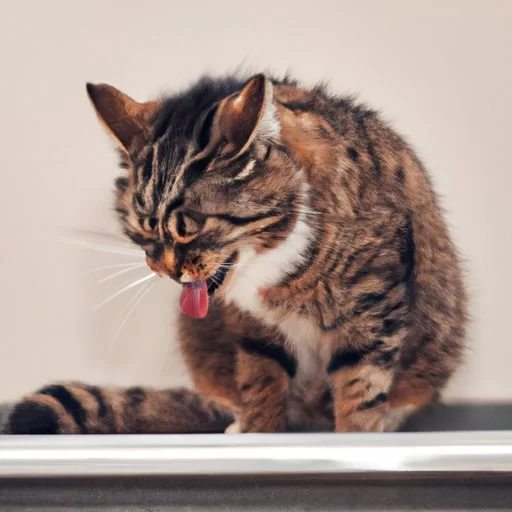Understanding Why Your Cat Is Coughing Up Furballs Regularly
<> SEO Keywords: cat coughing up furballs, cat furballs, cat hairballs, cat health, regular furballs in cats, Hidden Brook Veterinary <> SEO Description: Learn why your cat might be coughing up furballs regularly, the causes behind it, and tips on managing the issue. For expert advice and care, visit Hidden Brook Veterinary for the best solutions.- Why Cats Cough Up Furballs
- Common Causes of Furballs in Cats
- How to Reduce Furballs in Cats
- When to See a Veterinarian
- Eliminating the Furball Problem with Hidden Brook Veterinary
1. Why Cats Cough Up Furballs
If you’ve ever owned a cat, chances are you’ve witnessed them coughing up furballs from time to time. This is a natural process in which cats expel fur that they’ve ingested while grooming. While it can be a normal part of their grooming routine, some cats seem to cough up furballs regularly, which can be concerning for pet owners. Let’s take a closer look at why this happens.
1.1 Cats Groom Themselves Frequently
Cats are fastidious groomers, and they spend a significant amount of their day licking their fur. While this helps them stay clean, it also leads to the ingestion of hair, which can accumulate in the stomach. Eventually, the cat's body will expel the hair in the form of a furball.
1.2 Furball Expulsion Is a Natural Reflex
Furballs are typically a natural reflex. When the hair in the stomach builds up, cats will cough, hack, or vomit it up. This is their body’s way of eliminating the excess fur that cannot be digested.
2. Common Causes of Furballs in Cats
While furballs are a common occurrence, understanding the underlying causes of regular furball production can help you determine if there is a health concern. Here are some common causes of cats coughing up furballs regularly.
2.1 Shedding Season
During seasonal changes, especially in spring and fall, cats tend to shed more than usual. This increased shedding means more fur gets ingested during grooming, leading to a higher likelihood of furball production. Long-haired breeds are particularly prone to this issue due to the sheer amount of hair they have.
2.2 Over-Grooming
Some cats groom excessively due to stress, anxiety, or even boredom. This over-grooming behavior can cause an increase in the amount of fur ingested, which in turn leads to more frequent furballs. If your cat is constantly licking, it’s worth investigating the cause of this behavior.
2.3 Poor Diet
A poor diet can also contribute to excessive shedding. Cats that are not getting the proper nutrients or those with food sensitivities might shed more hair than usual. This could lead to more furballs, as the cat will ingest more fur while grooming.
3. How to Reduce Furballs in Cats
If your cat is coughing up furballs regularly, there are several things you can do to help reduce the frequency and severity of the issue. While it’s impossible to eliminate furballs entirely, these strategies can make a significant difference.
3.1 Regular Grooming
Regular grooming helps remove loose fur before your cat has a chance to swallow it. Brushing your cat’s coat, especially during shedding seasons, reduces the amount of hair that is ingested. Long-haired breeds, in particular, benefit from frequent brushing.
3.2 Specialized Diets and Supplements
Feeding your cat a diet specifically designed to reduce shedding or assist with hairball control can be highly beneficial. Look for cat food that contains higher fiber content, as fiber helps hair move through the digestive system more easily. Additionally, hairball control treats or supplements may also help reduce furball formation.
3.3 Keep Your Cat Hydrated
Proper hydration is essential for your cat’s digestive health. Ensuring that your cat drinks enough water can help keep their digestive system functioning properly, which can assist in moving hair through the digestive tract and reduce the likelihood of furballs.
4. When to See a Veterinarian
While occasional furball vomiting is normal, frequent or severe episodes could indicate a more serious issue. If your cat is coughing up furballs excessively, it’s important to seek veterinary advice. A visit to the vet is warranted if you notice any of the following:
4.1 Difficulty Vomiting or Coughing
If your cat seems to struggle when attempting to expel a furball or if the furball is not being expelled, this could be a sign of an underlying health problem, such as a gastrointestinal issue or blockage. Prompt veterinary care is needed in such cases.
4.2 Weight Loss or Reduced Appetite
If your cat is experiencing weight loss or has a decreased appetite alongside frequent furballs, this could indicate a health issue that requires professional diagnosis and treatment.
5. Eliminating the Furball Problem with Hidden Brook Veterinary
At Hidden Brook Veterinary, we understand the challenges of dealing with regular furball production in cats. Our team of expert veterinarians can help diagnose the cause of excessive furballs and provide a tailored treatment plan that includes dietary changes, grooming advice, and possible medical interventions. Whether it's addressing stress-related grooming behaviors or treating underlying health issues, we are here to help your cat live a happy, healthy life.












